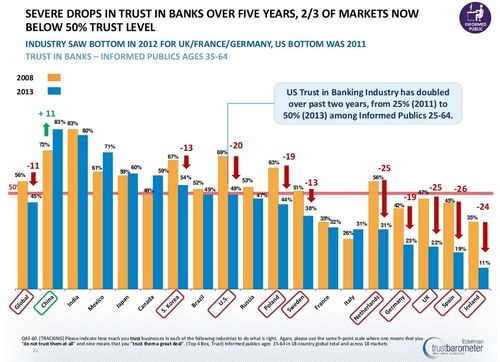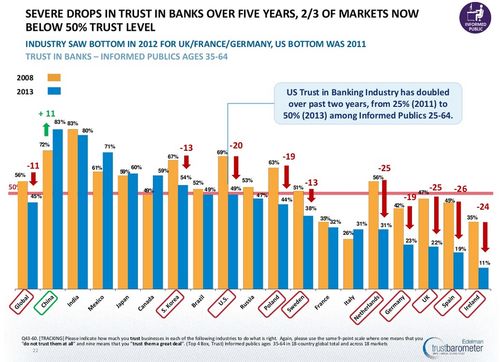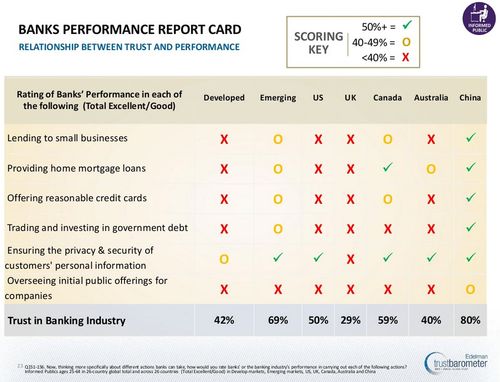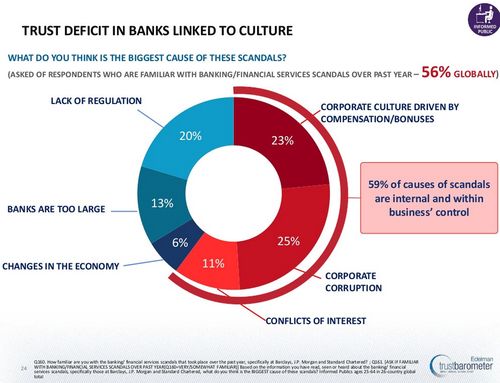
I recently hosted a meeting of financial market players to
talk about how to rebuild trust in banking.
It was an interesting evening, with most of the attendees
accepting that trust in banks was at an al-time low.
But how low is an all-time low?
Well, it’s pretty low
according to Edelman. Edelman are the
global press relations company who publish an annual trust index. The index measures the general trust in
government, media and business across 26 countries through interviews with over
31,000 people.
It’s pretty comprehensive.
And yes, according to the survey, trust in banking is at an
all-time low.

Most developed markets have placed trust in banks below 50%,
which is a sign of being untrustworthy, with the Irish, Spanish, Brits and
Dutch having the least trust and biggest drop in opinion of their banks whilst
the Chinese and Indians have the most trust.
This does not mean that Chinese and Indian banks are more trustworthy
than Irish and Spanish banks generally.
For me, it is a sign of how the media reports the banks activities combined
with the actual actions of the banks.
For example, some think that China is about to hit a financial derailment of a similar nature to the
subprime crisis, whilst bad debt threatens to bring down the Indian economy
according to the billionaire Uday Kotak,
whose family owns almost half of the
Indian bank KMB.
Nevertheless, trust in banks overall is high in India and
China and low in Western economies.
Delving down a layer below, it gets interesting as this lack
of trust is across all aspects of bank services: offering credit cards, providing
home loans, lending to small businesses, trading and investing in government debt
and launching new business.

As can also be seen, the UK has
the lowest trust of all, with British citizens not even trusting that their
bank will keep their information secure.
Interesting, as in another
survey just released, the British trust their banks far more than their
governments to protect them from financial losses.
ACI Worldwide, the payments
firm, also released a survey last week, and find that 80% of British citizens think
that government and law enforcement agencies only do an average or below
average job of fighting card or account fraud, whilst 90% say they have
confidence in their financial institution to protect them from card fraud.
So trust is a multi-coloured spectrum
of issues, with trust in banks as an industry being far less trustworthy than
trust in our own bank to look after our own financial assets.
These are two different things
and are the reason why, even with all this trashing of the banking system and
the industry’s reputation, most people have still not switched or changed their
bank.
This is well illustrated when
the Edelman survey charts the reasons why banks have lost trust.

It is a case of corporate culture and corruption being rotten, rather than the systems and processes the bank operates to manage our finances.
You may or may not agree with that assessment, but here's the whole survey for those who want to read more:
Along with the opening executive summar:
Hardly a month passed in 2012 without another financial
services organization in crisis management. Whether allegations of mortgage
fraud at Deutsche Bank or money laundering at HSBC, Libor manipulation at Citi
and Barclays (to name just two, both of which lost their CEOs over it) or rogue
traders at UBS, scandals drove news coverage. In turn, among informed publics
surveyed, 56 percent of whom say that over the past year they have been aware
of banking or financial services scandals, the industry’s reputation suffered.
In fact, the Trust Barometer shows globally a dip in trust
in banks from 56 percent in 2008 to 45 percent today (figure 7). Of the 18
countries for which the Barometer has data back to 2008, over that time trust
in banks dipped in nine, eight of which are developed countries. Over the past
two years, trust in banking in the U.S. has doubled from its lowest point at 25
percent in 2011 to 50 percent
Much of the
trust people place
in the banking
and financial services industry
rests on two attributes: perceived
performance and perceived behaviour. In
both, banks have fared poorly.
Performance
Of the top six areas in which banks operate – lending to
small business, providing home mortgage loans, offering cred- it cards, trading
and investing in government debt, ensuring privacy of personal information and
overseeing IPOs – in five of them, fewer than 40 percent of informed publics in
developed countries rate them doing well, while the lone holdout, ensuring privacy of pe sonal information,
still remains below 50 percent. In emerging countries, privacy is the only area
in which trust is more than 50 percent.
Canada and China rate banks as doing well in more than one
of these six areas – two in Canada, where overall trust in banks is 59 percent,
and five in China, where trust in banks is 80 percent. In the UK, where over-
all trust in banks is 29 percent, all
six areas fall below 40 percent trust.
Behaviour
Among informed publics, the many banking scandals of 2012
have caused a significant trust deficit linked to culture, corruption and
conflicts of interest (figure 8). Specifically, among those who are familiar
with banking/financial services scandals over the past year, 25 percent of
people felt corporate corruption was the biggest cause of scandal while 23
percent blamed corporate culture driven by compensation and 11 percent blamed
conflict of interests. Cumulatively, these account for 59 percent. People also
point to lack of regulation (20 per- cent), banks being seen as too large (13
percent) and changes in the economy (6 percent).
As performance becomes a less important factor in earning
trust (see page 9), the importance of how business behaves is growing. Only one
in five respondents feel business leaders will make ethical and moral decisions
and only 18 percent expect business leaders to tell the truth. Clearly
important, these behavioural aspects represent a growing concern for people who
see these behaviours as fully within the control of business.
So the question becomes: to recapture and expand trust, do
leaders in banking and financial services have what it takes (and are they
willing to modify their behaviour) to overcome a damaged industry reputation?
Moreover, will business leaders (outside financial services) and governmental
leaders, all of whom the Barometer suggests are tarred with the same brush,
listen and learn?
Chris M Skinner
Chris Skinner is best known as an independent commentator on the financial markets through his blog, TheFinanser.com, as author of the bestselling book Digital Bank, and Chair of the European networking forum the Financial Services Club. He has been voted one of the most influential people in banking by The Financial Brand (as well as one of the best blogs), a FinTech Titan (Next Bank), one of the Fintech Leaders you need to follow (City AM, Deluxe and Jax Finance), as well as one of the Top 40 most influential people in financial technology by the Wall Street Journal's Financial News. To learn more click here...






















